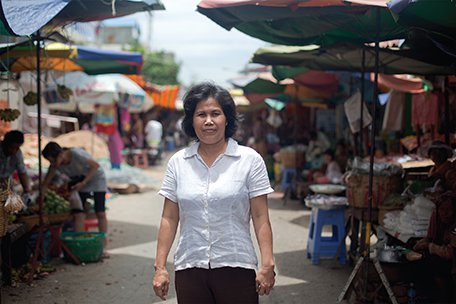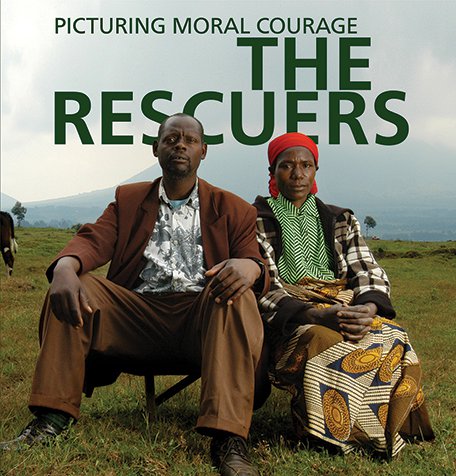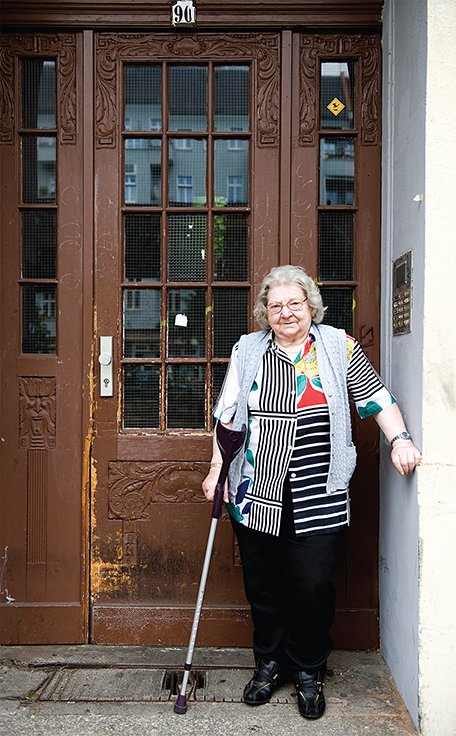Since its opening in 1996, Holocaust Museum Houston has asked visitors to consider the roles taken by people during the Holocaust and other genocides with the goal of eliminating apathy as a response to hatred and prejudice. The Museum’s newest exhibition will explore these important choices when “The Rescuers: Picturing Moral Courage,” opens March 28, 2014. In this exhibition, viewers will encounter images and stories of people who engaged in rescue activities during the Holocaust and genocides in Cambodia, Bosnia and Rwanda.
“The Rescuers: Picturing Moral Courage” is based on the work of Leora Kahn, who researched and interviewed rescuers from the Holocaust and other genocides. Each person’s image and testimony that visitors encounter in this exceptional photographic exhibition reflect “ordinary” citizens, who, by choosing to rescue the “other,” became heroes in a time when their country was committing acts of genocide. They came from different countries and different times, and for many, this is the first time they have told their stories – some risking their lives again in the telling. More than 30 images, accompanied by text from interviews, will tell the stories of farmers, taxi drivers, nuns, mothers and fathers who risked everything to save neighbors, friends and strangers.
Malka Drucker writes in the introduction to “Rescuers: Portraits of Moral Courage” that “Unlike the bystanders who chose to accept life’s unfairness, the rescuers adopted an activist, aggressive stance when confronted by Nazi oppression of Jews. Whether his or her opposition stemmed from religious belief, a political ideology, a family tradition of social activism, or personal experience, almost every rescuer was unusually intolerant of human injustice.” When asked why she saved a person, Mina Jahi, who engaged in rescue during the genocide in Bosnia and Herzegovina, replied: “I knew that the same fate could happen to my children, to my sons, and it was totally normal to help a man in trouble. I didn’t separate him from my own children.” Enoch Rwanburindi of Rwanda said of his choice to rescue, “… I considered all human beings as God’s creation and loved them the same way.”
The exhibit is designed to raise awareness for the need to stand up to the injustices that are still happening in the world around us, and to contribute to the understanding of peace. Holocaust historian Dr. Debórah Dwork, Rose Professor of Holocaust History and director of the Strassler Center for Holocaust and Genocide Studies at Clark University notes, “With the example of the rescuers, we are now a little better prepared to give aid to those in danger, wherever and whenever that might be.” It is hoped that after viewing the photographs and learning from the accompanying thought-provoking stories, visitors will think about the choices that can be made in their lives every day and choose to join the Museum’s efforts to Stop Hate. Starting Here.
Holocaust Museum Houston members are invited to a preview reception Thursday, March 27, 2014, from 6 p.m. to 8 p.m. Admission is free, but advance registration is requested for the reception. Visit www.hmh.org/RegisterEvent.aspx to RSVP online. Nonmembers who wish to join and attend may call 713-527-1640.
About the Curator
Leora Kahn is founder and executive director of PROOF: Media for Social Justice. She works on global projects, partnering with organizations such as Amnesty International and the United Nations. Her 2007 book “Darfur: 20 Years of War and Genocide in Sudan” is an award-winning effort, and Holocaust Museum Houston’s exhibition of this work traveled throughout the United States. Kahn’s last book, “Child Soldiers,” travels with an exhibit she curated in collaboration with the U.N.’s Office on Children and Armed Conflict. Kahn works with the Genocide Studies Program at Yale University, where she conducts research on rescuing behavior. She teaches on topics in human rights and photography. Kahn worked with four different photographers as she conducted research and curated this exhibition: Riccardo Gangale (Rwanda), Nicolas Axelrod (Cambodia), Paul Lowe (Bosnia) and Sonia Folkmann (Europe/the Holocaust).
About the Photographers
Riccardo Gangale was born in Rome in 1975. After completing scientific studies and two years of political science, he joined a three-year master course in professional photography in Rome. In 2002, while still studying, Gangale traveled to Ethiopia to work with the program “Food for the Cities.” In the fall of 2002, he worked in South Africa for a project on landless people, as well as working with the World Summit on sustainable development.
Since September 2003, he has been working for the Associated Press as a correspondent in the Great Lakes region and has been living in Kigali, Rwanda ever since. The New York Times, Time Magazine, The Times, The Guardian, the Guardian Weekly, Liberation, Der Spiegel, Le Monde, The Washington Post and others have published some of his works.
Nicolas Axelrod has been based in South East Asia since 2008. An Australian, he moved to Cambodia after living and working in Perth, Western Australia, as a freelance photographer as well as for a Perth-based commercial photographer. Now living in Phnom Penh, he works as a freelance photographer. He has also worked for various non-governmental organizations, local and international magazines and private clients in Cambodia.
Paul Lowe is a senior lecturer in photography at the University of the Arts, London, and an award-winning photographer living and working between Sarajevo and London. His work is represented by Pano Pictures and has appeared in Time, Newsweek, Life, The Sunday Times Magazine, The Observerand The Independent, among others. He has covered breaking news the world over, including the fall of the Berlin wall, Nelson Mandela’s release, the conflict in the former Yugoslavia and the destruction of Grozny.
Since 2004, he has been the course leader of the Master’s Programme in Photojournalism and Documentary Photography at the London College of Communication. His book “Bosnians” documented 10 years of the war and post-war situation in Bosnia.
Sonia Folkmann was born in Poland in 1975, and at the age of 13, she and her family moved to Dusseldorf, Germany. After she completed a one-year internship at a photographic studio, she fell so deeply in love with the art of photography that she decided to get a professional education in photography. After graduating from art school as the top student, she worked several years with different photographers all over the world.
Since 2006, she has been working as a freelance photographer and pursues her own projects, including fine art series, reportage and design books. In 2009 and 2010, she won in collaboration with New Cat Orange Agency the Red Dot Design Award in category Best of the Best.
Patrons
Cheryl and Stephen Golub
Hamill Foundation
Gail and Milton Klein in loving memory of Renée Danziger
The Sterling Family Foundation
Sponsors
Isabel and Danny David
The Enrico and Sandra Di Portanova Foundation
The Nina and Michael Zilkha Endowment Fund
Resources
Press Release




